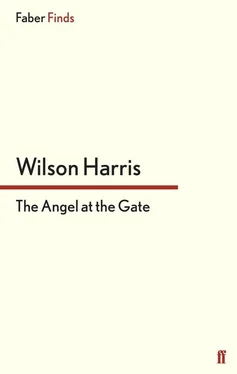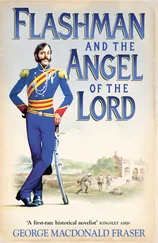Wheeler had been chosen as a random humanist to set Khublall’s Hindu funeral fire into curious perspective.
They were landing now on Planet Bale, the funeral of an age had commenced, the oddest conversation of an age, seed of the conversion of an age within a black Jamaican, a self-centred Hindu, a Don Juan of science. It was, to say the least, an unpromising start on the face of things to converting the multitude of banalities that ingrained the pavement of the psyche, that encircled the marble of the globe seen from lofty Bale. But faint beginnings are the only authentic shock of reality.
Marsden’s concave body was the gateway into Bale. Mary recalled Sebastian’s hollow trunk as the gateway into Dolphin Street. A neo-physical eye (or accumulation of obsolete structures to mimic the dead or greet the unborn) was planted on Bale to warn of the horrors of an atomic age and to assess magnifications one had taken for granted on Earth. On Planet Bale everything was equally magnified but for a different reason; to portray a fire that reduces “size” into “qualitative mystery” (or nothing at all) rather than “quantity-for-the-sake-of-quantity”.
In that qualitative approach to mesmeric quantity, they found themselves looking up to a mountainous brain with its smooth, bare, skull-like expanse of head turned backwards from a neck of land to expose a low beard of burning trees. It was as if the brain or head he left on the city pavement had been sliced from the region on which it stood in flashing wake or atomic accident to be driven instantly forwards upon the pavement into what seemed a great distance in the porous eyes of broken body. As a consequence they saw — as they had never seen before — the implications of invisible fire as the womb of mind in space. Constellations of random rock or skull shimmering through Mary’s body that had been lit by grace, by prophetic grace and simultaneous warning, simultaneous capacity for conversion of deeds to avert catastrophe… Wheeler’s eyes almost popped out of his head. Khublall remained non-committal but he too was moved more deeply than he wished to say. Jackson felt a profound tremor in the pit of his stomach.
Khublall saw his young bride all over again. He reached out but could not touch her in Mary’s body. Perhaps what he saw was the ash of her robe, the funeral pyre. He shook his head. He had learnt not to cry over the lessons of fate. After all, his wife’s death, by every commonsense Asian calculation, scarcely mattered upon a crowded continent teeming with millions and millions and millions of lives, and yet its very insignificance was a measure of holy atom in shaven skull. The world fell apart for him the day that she died. That a single death amidst millions of meaningless lives should brim with such grief in him was a measure of despair, of insignificance and waste that were oppressive; it was also a reflection of faint person one sees again and again in the womb of fire who is intelligible not only to despair but to prophetic seed of endangered millions and millions in a nuclear age.
Wheeler’s scientific brain was a neo-puritan tool to enjoy the flesh of the cosmos but to reduce leprous or leprotic gaieties, carnival plague. Yet with each reduction of carnival plague, that very brain — in its borrowed spoil or womb of fire — hatched automatic technologies upon which sick gaieties throve afresh in even more seductive apparel. The reduction of plague seemed therefore ultimately meaningless except in the degree that a quality of terror linked Wheeler’s science to Khublall’s mystical despair, a quality of terror that was the seed of conversion within all mutualities, the fire of fanaticism and the fire of humility, the fire of glory and the fire of sacrifice, the fire of hubris and the fire of true pride.
Jackson was intent on returning to earth and had placed his foot on the ladder. From the height on which he stood, the pavements of cities seemed to run parallel in ascent and descent to the rocks of Bale, hills uncoiled into plains, a bird’s eye glitter and mist of proportions ran through the breath of the crowds, crowds with the steam of factories, football grounds, the lighter steam of offices, the variegated steam of cinemas; crowds laughing, it seemed, with one half of a collective face, crying involuntarily with the other half, the individual fall or ebb in tidal collective hypnosis. That individual ebb and flow was Jackson’s body raised like a slightly fluttering feather far up in space. It unravelled the masquerade. The torment remained but an equation existed between material excess and the birth of prophetic spirit.
The walls of the ravine from which he needed to descend to return to Earth were flanked by sculptures he had never seen before. First came sculptures based on acquisitions of material pride so borne — they seemed from where he stood — on the back of aerial fire that they seemed magical creatures of daemonic insight into beauty and intelligence. Pride was the materialization of inner fire as well in bird’s eye glitter and mist of proportions arising from collective torment on earth; pride was increment upon increment of fire into stable form, and stability — the virtue of stability — became a masquerade aided and abetted by intelligence and beauty. Yet there was true pride however buried in a camouflage of glittering ambition.
The bird’s eye mist helped to make it strangely clear.
For it raised in Jackson’s mind the following question: where lay the essence of beauty, the essence of femininity in Mary’s fire? Had Mary incorporated into herself multi-faceted mirrors born of fire, so that one aspect of herself was so brilliantly attired, it caught something of the male animal, the exuberant feather, the exuberant colour of male birds and male creatures?
Had he (Jackson) in seeking to fly from Bale incorporated into himself something of the female animal, the female bird in nature, sober dress, the shrinkage, the reduction of blaze or colour? Was this a sign of his conversion, or of his fear, was it a sign of pregnant memory in him and that he needed to look through the flame of time in Mary’s mirrors back across the years, to look back like Khublall into his marriage and into the birth of a child he had called a “daughter of Man” and whom he had lost?
* My translation of Mary Stella Holiday’s automatic fiction now approaches stage that reflects a marked change in the materials on which I worked.
That change actually began in the encounter with Stella at the hospital gates following which Mary started to refer to Marsden by his Christian name, Joseph.
It is interesting to note that one of the first signs of this intimacy, so to speak, occurs when Joseph Barber — the chauffeur who drove her to Stella’s hospital — appears. Joseph Barber has the vestige of a beard and a shadowy resemblance to Marsden. He is an inferior, however good-natured, aspect of Marsden. He “feasts on her legs” Mary reports. He is the messenger who declares that Marsden’s roots run deep in eccentric Joseph Barber lust as well as in the marvel of Joseph Marsden selfless affection. Thus in the midst of her distraught state on meeting Stella at the hospital gates arises a capacity to return to Angel Inn and perceive Marsden not only as a “father” but as “Joseph”, the man of profound, human stature who cares for her.
It is this catalyst — this identification of Joseph with all worlds, common-or-garden, metaphysical, as well as heavens above — that brings into play in Mary’s automatic book the expedition to Planet Bale that follows this interval and is promoted by her clairvoyant perception of Joseph Marsden’s death.
She arrives at Angel Inn, finds Marsden in bed after a shock he receives on the street, and is filled with foreboding as she perceives his coming death (he actually dies in June as I mention in my prefatory Note).
Читать дальше












